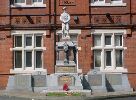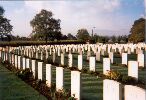
Newton-le-Willows and
Earlestown War Memorial

| OTHER WARS |
 |
Newton-le-Willows andEarlestown War Memorial |
 |
| The
Great War Roll of Honour |
|||||||||||||||||||||||||
From the distance you assume it to be one of those grandiose monuments to the
vanity of Saddam Hussein. For this is a country where the only monuments allowed
were usually those which glorified the dictator.
But turn off the broad highway, and across the sun blasted desert, past the gutted tanks of a defeated army, and the children running alongside with their hands outstretched for money. Drive across the old Ottoman rail line whose wooden sleepers long ago vanished for firewood, and on in the dust and heat until the track narrows and the monument comes clearly into view.
It is built of ochre coloured stone and when you get close it is obvious that it has nothing to do with Saddam. There is none of the grandiosity, none of the spectacular bad taste of 20th century dictator chic. This is the creation of a lost imperial age.
It's quickly obvious the memorial has nothing to do with Saddam |
British troops are planning to commemorate fallen comrades |
'Fallen warriors'
It is formed in roughly a semi-circle; there is a walkway which extends for several hundred yards and set into the stone are the names of hundreds of fallen British and Commonwealth troops. There is a pillar at the centre which informs the visitor that these are men who died in the Iraq campaign of 1914 to 1921. They fell here around Basra and in the hellish siege of Kut and at other nameless places in the Arabian desert. They fought the soldiers of the declining Ottoman empire and when that fight was done they fought the Shia of southern Iraq who rose to claim their own freedom. It was a bitter and bloody age.
Curiously Saddam preserved this monument. He had it moved, carefully, from the port to the desert but did not destroy it.
"Perhaps he had some feeling for the fallen warrior," a British officer said to me.
I doubted it but am at a loss still to understand why the dictator allowed this monument to the imperial dead to remain standing.
There is an appropriate silence here - even the money changers, children mostly, approach you in whispers with their wads of dinars. Over the decades the desert winds have done their work: segments of the slate have collapsed on the ground. There are little fragments of names scattered in the sand. A large crack has appeared where the men of the Western Ontario Regiment are remembered. Nearby is a sentence as sad as any I've read in war. It says simply: For Subhadar Mahanga and 1,770 other Indian soldiers.
Mutiny
As I walked I saw the names of my own countrymen: Flaherty, Nugent, Carney: men from the Royal Dublin Fusiliers and from the Connaught Rangers. The Connaught Rangers... when they left Iraq in 1921 they went to India and there they mutinied. Stories had reached them of reprisals carried out by British forces fighting the rebels in Ireland. Men who had fought a Shia rebellion in Iraq now took up arms against empire themselves. It failed of course. The leader of the mutiny was executed and the Connaught Rangers were disbanded.
Come Remembrance Day, the monument will have been repaired, I'm told, and hundreds of troops will commemorate their fallen comrades. They will remember the soldiers who have died in this latest of Iraq's wars, and they will wonder what the months, maybe years, ahead will bring for the fighting men.
'Culture of brutality'
Iraq these days is no easy place for a teenager from Lancashire or Glasgow.There is a sullen acceptance of their presence but beneath Iraq's many surfaces the factions are aligning and re-aligning.
There are criminal gangs who specialise in everything from smuggling sheep to kidnapping young women for sale in other Arab countries. A few days back the military received a call to say several bodies had been dumped on the side of the road. They are sent to sort out the mess made by others. They were Sunni Muslims. They had been kidnapped by a Shia tribe, tortured, mutilated and dumped.
In the crowded streets patrolling troops are beset by locals demanding to know why they haven't solved all of the problems caused by Saddam, sanctions, war and the dreadful post-war planning, or lack of planning, of the Pentagon. Those I joined on patrol responded with tact and good humour, showing maturity way beyond their years.
But what happens to them depends much more on the bigger political picture, what happens in London, Washington and Baghdad. It also depends on the violent history of Iraq, how much of that culture of brutality has seeped into the present.
For this is a universal truth of peacekeeping. They are sent to sort out the mess made by others. It is a messy business and British lives have been lost already. Nobody expects the coming months to be any easier.
As I walked past the rows of names in the desert, I thought of that line from Plato: only the dead have seen the end of war.
Commonwealth War Graves Commision information
can be found here.